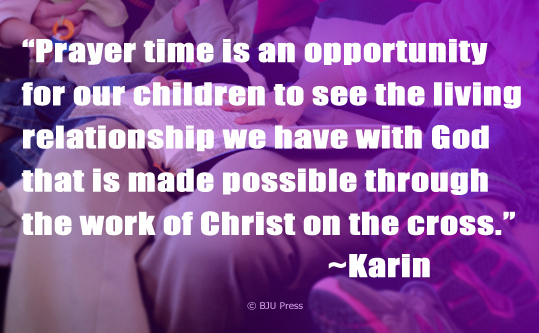“What a delicious feast you made us, Mommy!”
“Yes, thank you very much, Mom. I’ll help wash the dishes, but first, Dad, can we do our family worship time?”
“Yes, can we? I love family devotions!”
Sorry, but that’s not my family. Our Bible time rarely goes without at least one child complaining, interrupting, or trying hard to get away with the least participation possible. Sulking, slouching, and mumbled answers are common. Will we outgrow this stage? I sure hope so, but I grew up in a family that consistently practiced devotions, and often I was less than enthusiastic about the “interruption” in my day when Dad called us together.
In Part 1 of this series, I made the case for why family worship is important. In Part 2 and Part 3, I shared my view of the basic structure of family devotions. Now in Parts 4 and 5, I want to focus on some common impediments to Bible time and discuss possible ways to overcome them.
Hostile Hearts
We must realize that our children are not born with hearts that seek God; on the contrary, our natural hearts are hostile toward God (Romans 3:11, 8:7). Unless all your children have been born again, view family devotions as an evangelistic work and expect opposition. As with other spiritual battles, you will need to fight with prayer (Ephesians 6:10-20).
Busyness
Are we really too busy? It comes down to priorities. We make time for regular mealtimes with our children to feed our bodies. We can make time to feed our souls (1 Peter 2:2). It might take some adjustment of the schedule or cutting out other activities, but my husband and I have found that if we make it a priority, we can carve out ten to thirty minutes for our family devotions.
As Scot Chadwick points out, “The root problem and solution is our personal devotion to God: How must we grow in love, affection, and worship of our great God? The truth is that we do what is important to us, for good or for bad. Let us prove our love of God in the practice of our devotion, particularly in family worship.”

Inconsistency
Many families may find that it’s easy to get started doing family worship, but it can be a challenge to keep the initial enthusiasm from petering out or the demands of the day from interrupting. One answer is to schedule a regular time for family devotions, a time that isn’t easily missed, such as first thing in the morning, right after supper, or just before bed. That way the children come to expect family worship, if not anticipate it.
When I was a child, Bible time was before Dad went to work. With our family now, my husband typically leads devotions right after dinner while we’re all still at the table, after the food is put away but before the dishes are done. This way the family is already together (rather than having to chase down the younger ones or wait for older children to drag themselves in), plus the little ones are safely contained in highchairs.
In Part 5, I’ll talk about other obstacles to family devotions, such as dealing with bad attitudes. In the comments section, I’d love to hear how your family has maintained consistency and overcome obstacles in family worship.
What has your family done to establish a consistent family devotions routine?


